Japan Football League facts for kids
 |
|
| Founded | 1999 |
|---|---|
| Country | Japan |
| Confederation | AFC |
| Number of teams | 16 |
| Level on pyramid | 4 |
| Promotion to | J2 League (1999–2013) J3 League (2014–present) |
| Relegation to | Japanese Regional Leagues |
| Domestic cup(s) | Emperor's Cup |
| Current champions | Tochigi City FC (1st title) (2024) |
| Most championships | Honda FC (10 titles) |
The Japan Football League, often called the JFL, is a major football league in Japan. It's the fourth level in the Japanese football pyramid, sitting just below the three J.League divisions. Many teams in the JFL are professional and hope to join the J.League one day.
Contents
JFL's Place in Japanese Football
The JFL is considered the top amateur football league in Japan. Even though it's called "amateur," many teams have professional players. It acts as a stepping stone for clubs aiming to become fully professional and join the J3 League, which is the third division of the J.League.
JFL History: How it Started
The Japan Football League began in 1999. This was the same year the J.League created its second division, called J2. Before 1999, there was an older JFL that was the second-highest league.
When the new JFL started, nine teams from the old league joined J2. The remaining seven teams, plus a winner from a regional competition, formed the new JFL. Yokohama FC also joined as a special case. So, nine teams played in the very first JFL season in 1999.
Some of the first teams included Denso SC, Honda Motors, Sony Sendai, and Yokohama FC. Over the years, the number of teams in the JFL changed. It grew from 9 to 12, then to 16, and even 18 clubs at one point.
In 2014, the J.League created a new third division, the J3 League. This meant that 10 teams from the JFL moved up to J3. The JFL then became the fourth-tier league, which is where it is today.
Several former JFL clubs have even made it to the top league, J1 League. These include Yokohama FC, Tokushima Vortis, Matsumoto Yamaga, V-Varen Nagasaki, and Machida Zelvia.
Starting in 2026, the J.League will change its season to run from autumn to spring. The JFL has also decided to follow this new schedule, so the 2025 season will be the last one played within a single calendar year.
How JFL Teams Work
JFL clubs can be connected to companies, or they can be independent clubs. Some university teams used to play in the JFL, but that's not common anymore. Only independent clubs can become "J.League associate members," which is a step needed to get promoted to the J.League.
Moving Up: Promotion from JFL
For a JFL club to move up to the J3 League, it needs to meet certain requirements. The main goal is to get approved by the J.League Committee and become a J.League associate member.
Here's how promotion works between J3 and JFL:
- If the JFL champion has a special J3 license, they automatically swap places with the last-placed team in J3.
- If the JFL runner-up has a license (but the champion doesn't), they play a special playoff match against the last-placed J3 team.
- If both the JFL champion and runner-up have licenses, the champion goes up automatically. The runner-up then plays a playoff against the second-to-last team in J3.
- If neither the champion nor the runner-up has a J3 license, no teams get promoted from the JFL that year.
Moving Down: Relegation from JFL
Teams can also move down from the JFL. The team at the very bottom of the JFL table usually gets relegated directly. They swap places with the winner of a special competition for regional league teams. The team ranked 15th in the JFL might also play a playoff match against the second-place team from that regional competition.
Emperor's Cup: A Special Tournament
The Emperor's Cup is a big national football tournament in Japan. In the past, only the top JFL teams at certain points in the season could enter this cup directly. Now, most JFL clubs have to win a qualifying cup in their local area to get a spot in the Emperor's Cup.
JFL Seasons and How They Play
The JFL season usually involves teams playing each other twice, once at home and once away. The team with the most points at the end of the season becomes the champion. From 2014 to 2018, the league used a different system with two halves (Apertura and Clausura), and the winners of each half played for the championship. But since 2019, it's back to the single table system.
Participating Clubs in 2025
There are 16 clubs competing in the 2025 Japan Football League season. Some of these clubs are working towards joining the J.League.
| Club name | First season in JFL |
Seasons in JFL |
Home town(s) | Current spell in JFL |
Last title |
Qualifiable base for J.League |
|---|---|---|---|---|---|---|
| Asuka FC | 2025 | 0 | Kashihara, Nara | 2025– | – | No |
| Atletico Suzuka | 2019 | 6 | Suzuka, Mie | 2019– | – | No |
| Briobecca Urayasu Ichikawa | 2016 | 4 | Urayasu, Chiba | 2023– | – | No |
| Criacao Shinjuku | 2022 | 3 | Shinjuku, Tokyo | 2022– | – | Yes |
| Honda FC | 1999 | 26 | Hamamatsu, Shizuoka | 1999– | 2023 | No |
| Iwate Grulla Morioka | 2025 | 0 | Morioka, Iwate | 2025– | – | Yes |
| Maruyasu Okazaki | 2014 | 11 | Okazaki, Aichi | 2014– | – | No |
| Minebea Mitsumi | 2005 | 18 | Miyazaki, Miyazaki | 2009– | – | No |
| Okinawa SV | 2023 | 2 | Uruma, Okinawa | 2023– | – | No |
| Reilac Shiga | 2008 | 17 | Hikone, Shiga | 2008– | – | Yes |
| ReinMeer Aomori | 2016 | 9 | Aomori, Aomori | 2016– | – | Yes |
| Tiamo Hirakata | 2021 | 4 | Hirakata, Osaka | 2021– | – | No |
| Veertien Mie | 2017 | 8 | Kuwana, Mie | 2017– | – | Yes |
| Verspah Oita | 2012 | 13 | Beppu, Ōita | 2012– | 2020 | Yes |
| Yokogawa Musashino | 1999 | 26 | Musashino, Tokyo | 1999– | – | No |
| YSCC Yokohama | 2012 | 2 | Yokohama, Kanagawa | 2025– | – | Yes |
- Pink background means the club was recently promoted from a regional league.
- Gray background means the club was recently relegated from J3.
- Clubs in bold have a J3 League license, which is needed for promotion.
Stadiums Where JFL Teams Play
JFL teams play in various stadiums across Japan. Here are some of the main stadiums used by the clubs in the 2025 season:
| Asuka FC | Atletico Suzuka | Briobecca Urayasu Ichikawa | Criacao Shinjuku |
|---|---|---|---|
| Kashihara Park Athletic Stadium | Mie Suzuka Sports Garden | Kashiwanoha Stadium | Ajinomoto Field Nishigaoka |
| Capacity: 5,000 | Capacity: 19,694 | Capacity: 20,000 | Capacity: 7,258 |
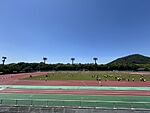 |
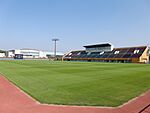 |
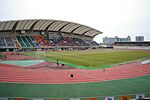 |
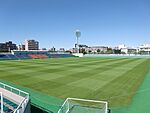 |
| Honda FC | Iwate Grulla Morioka | Maruyasu Okazaki | Minebea Mitsumi |
| Honda Miyakoda Soccer Stadium | Iwagin Stadium | Maruyasu Okazaki Ryuhoku Stadium | Nobeoka Nishishina Athletic Stadium |
| Capacity: 2,500 | Capacity: 9,892 | Capacity: 5,000 | Capacity: 15,000 |
 |
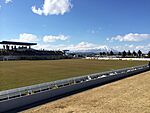 |
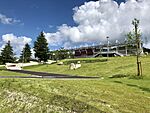 |
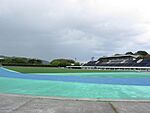 |
| Okinawa SV | Reilac Shiga | ReinMeer Aomori | Tiamo Hirakata |
| Tapic Kenso Hiyagon Stadium | Heiwado HATO Stadium | Kakuhiro Group Athletic Stadium | Hirakata City Athletics Stadium |
| Capacity: 12,270 | Capacity: 15,000 | Capacity: 2,500 | Capacity: 12,500 |
 |
 |
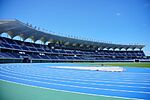 |
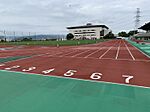 |
| Veertien Mie | Verspah Oita | Yokogawa Musashino | YSCC Yokohama |
| Asahi Gas Energy Toin Stadium | Oita Sports Park | Musashino Municipal Athletic Stadium | Mitsuzawa Stadium |
| Capacity: 5,104 | Capacity: 2,040 | Capacity: 5,192 | Capacity: 15,454 |
 |
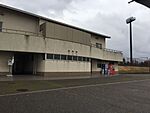 |
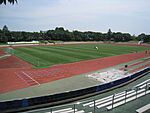 |
 |
Former JFL Clubs
Many clubs have played in the JFL over the years. Some have moved up to the J.League, while others have moved to different regional leagues or even stopped playing.
| Club name | First season in JFL |
Seasons in JFL |
Hometown(s) | Last spell in JFL |
Last JFL title |
Current league |
|---|---|---|---|---|---|---|
| ALO's Hokuriku | 2000 | 8 | Toyama, Toyama | 2000–2007 | – | Defunct, merged into Kataller Toyama |
| Arte Takasaki | 2004 | 8 | Takasaki, Gunma | 2004–2011 | – | Defunct |
| Azul Claro Numazu | 2014 | 3 | Numazu, Shizuoka | 2014–2016 | – | J3 |
| Kyoto BAMB 1993 | 2000 | 4 | Kyoto, Kyoto | 2000–2004 | – | Kansai League D1 |
| Blaublitz Akita | 2007 | 7 | All cities/towns in Akita | 2007–2013 | – | J2 |
| Cobaltore Onagawa | 2018 | 1 | Onagawa, Miyagi | 2018 | – | Tohoku League D1 |
| Ehime FC | 2001 | 5 | All cities/towns in Ehime | 2001–2005 | 2005 | J3 |
| Fagiano Okayama | 2008 | 1 | All cities/towns in Okayama | 2008 | – | J1 |
| Fagiano Okayama Next | 2014 | 3 | Okayama, Okayama | 2014–2016 | – | Defunct |
| Fukushima United | 2013 | 1 | Fukushima, Fukushima | 2013 | – | J3 |
| Gainare Tottori | 2001 | 10 | All cities/towns in Tottori | 2001–2010 | 2010 | J3 |
| FC Gifu | 2007 | 1 | All cities/towns in Gifu | 2007 | – | J3 |
| Mito HollyHock | 1999 | 1 | Mito, Ibaraki | 1999 | – | J2 |
| FC Imabari | 2017 | 3 | Imabari, Ehime | 2017–2019 | – | J2 |
| Iwaki FC | 2020 | 2 | Iwaki, Fukushima | 2020–2021 | 2021 | J2 |
| Jatco SC | 1999 | 5 | Numazu, Shizuoka | 1999–2003 | – | Defunct |
| JEF Reserves | 2006 | 6 | Ichihara, Chiba | 2006–2011 | – | Defunct |
| Kagoshima United | 2014 | 2 | Kagoshima, Kagoshima | 2014–2015 | – | J3 |
| Kagura Shimane | 2019 | 4 | Matsue, Shimane | 2019–2022 | – | Defunct |
| Kamatamare Sanuki | 2011 | 3 | All cities/towns in Kagawa | 2011–2013 | – | J3 |
| FC Kariya | 1999 | 11 | Kariya, Aichi | 2021 | – | Tōkai League D1 |
| Kataller Toyama | 2008 | 1 | All cities/towns in Toyama | 2008 | – | J2 |
| Kochi United | 2020 | 4 | Kochi, Kochi | 2020–2024 | – | J3 |
| Kokushikan University | 1999 | 6 | Machida, Tokyo | 1999–2003 | – | Kantō University League |
| Mitsubishi Motors Mizushima | 2005 | 5 | Kurashiki, Okayama | 2005–2009 | – | Chugoku League |
| Fujieda MYFC | 2012 | 2 | Fujieda, Shizuoka | 2012–2013 | – | J2 |
| Nara Club | 2014 | 9 | All cities/towns in Nara | 2014–2022 | 2022 | J3 |
| New Wave Kitakyushu | 2008 | 2 | Kitakyushu, Fukuoka | 2008–2009 | – | J3 |
| FC Osaka | 2014 | 9 | Higashiōsaka, Osaka | 2014–2022 | – | J3 |
| Otsuka Pharmaceuticals | 1999 | 6 | All cities/towns in Tokushima | 1999–2004 | 2004 | J2 |
| Nagano Parceiro | 2011 | 3 | Nagano, Nagano | 2011–2013 | 2013 | J3 |
| Profesor Miyazaki | 2002 | 1 | All cities/towns in Miyazaki | 2002 | – | Defunct |
| Rosso Kumamoto | 2001 | 4 | Kumamoto, Kumamoto | 2006–2007 | – | J2 |
| Renofa Yamaguchi | 2014 | 1 | Yamaguchi, Yamaguchi | 2014 | – | J2 |
| FC Ryukyu | 2006 | 8 | All cities/towns in Okinawa | 2006–2013 | – | J3 |
| Ryutsu Keizai University | 2005 | 6 | Ryugasaki, Ibaraki | 2005–2010 | – | Kantō League D1 |
| Ryutsu Keizai Dragons Ryugasaki | 2015 | 5 | Ryugasaki, Ibaraki | 2015-2019 | – | Kantō League D1 |
| SC Sagamihara | 2013 | 1 | Sagamihara, Kanagawa | 2013 | – | J3 |
| Sagawa Express Osaka | 2002 | 5 | Higashisumiyoshi-ku, Osaka | 2002–2006 | – | Defunct, merged into Sagawa Shiga |
| Sagawa Express Tokyo | 2001 | 6 | Kōtō, Tokyo | 2001–2006 | – | Defunct, merged into Sagawa Shiga |
| Sagawa Shiga | 2007 | 6 | Moriyama, Shiga | 2007–2012 | 2011 | Defunct |
| Shizuoka Sangyo University | 2000 | 3 | Iwata, Shizuoka | 2000–2002 | – | Tōkai University League |
| Sony Sendai FC | 1999 | 26 | Sendai, Miyagi | 1999–2024 | 2015 | Defunct |
| SP Kyoto FC | 2003 | 13 | Uji, Kyoto | 2003–2015 | – | Defunct |
| Tegevajaro Miyazaki | 2018 | 3 | Miyazaki, Miyazaki | 2018–2020 | – | J3 |
| Thespa Kusatsu | 2004 | 1 | All cities/towns in Gunma | 2004 | – | J2 |
| Tochigi City FC | 2010 | 8 | Tochigi | 2024 | 2024 | J3 |
| Tochigi SC | 2000 | 9 | Utsunomiya, Tochigi | 2000–2008 | – | J3 |
| V-Varen Nagasaki | 2009 | 4 | All cities/towns in Nagasaki | 2009–2012 | 2012 | J2 |
| Vanraure Hachinohe | 2014 | 5 | Hachinohe, Aomori | 2014–2018 | – | J3 |
| Matsumoto Yamaga | 2010 | 2 | Matsumoto, Nagano | 2010–2011 | – | J3 |
| YKK AP | 2001 | 7 | Kurobe, Toyama | 2001–2007 | – | Defunct, merged into Kataller Toyama |
| Yokohama FC | 1999 | 2 | Yokohama, Kanagawa | 1999–2000 | 2000 | J1 |
| Machida Zelvia | 2009 | 4 | Machida, Tokyo | 2013 | – | J1 |
| Zweigen Kanazawa | 2010 | 4 | Kanazawa, Ishikawa | 2010–2013 | – | J3 |
- Pink background means the club was recently promoted to J3 League.
JFL Champions: Who Won the Most?
Honda FC is the most successful club in JFL history, with 10 titles! Here's a look at the clubs that have won the JFL championship.
| Club | Winners | Runners-up | Winning seasons | Runners-up seasons |
|---|---|---|---|---|
| Honda FC |
|
|
2001, 2002, 2006, 2008, 2014, 2016, 2017, 2018, 2019 2023 |
1999, 2000, 2003, 2004, 2021 |
| Sagawa Shiga |
|
|
2007, 2009, 2011 | 2010 |
| Otsuka Pharmaceuticals |
|
|
2003, 2004 | 2001 |
| Yokohama FC |
|
|
1999, 2000 | |
| Nagano Parceiro |
|
|
2013 | 2011, 2012 |
| Sony Sendai |
|
|
2015 | 2019 |
| Ehime FC |
|
|
2005 | |
| Gainare Tottori |
|
|
2010 | |
| V-Varen Nagasaki |
|
|
2012 | |
| Verspah Oita |
|
|
2020 | |
| Iwaki FC |
|
|
2021 | |
| Nara Club |
|
|
2022 | |
| Tochigi City FC |
|
|
2024 | |
| Sagawa Express Tokyo | 0 | 2 | 2002, 2006 | |
| FC Osaka |
|
|
2018, 2022 | |
| YKK AP |
|
|
2005 | |
| Rosso Kumamoto |
|
|
2007 | |
| Tochigi SC |
|
|
2008 | |
| Yokogawa Musashino |
|
|
2009 | |
| Kamatamare Sanuki |
|
|
2013 | |
| SP Kyoto FC |
|
|
2014 | |
| Vanraure Hachinohe |
|
|
2015 | |
| Ryutsu Keizai Dragons |
|
|
2016 | |
| ReinMeer Aomori |
|
|
2017 | |
| Tegevajaro Miyazaki |
|
|
2020 | |
| Briobecca Urayasu |
|
|
2023 | |
| Kochi United SC |
|
|
2024 |
JFL Player Records
Here are some of the players who have played the most games or scored the most goals in the JFL.
|
|
More About Japanese Football
- Sport in Japan
- Football in Japan
- Women's football in Japan
- Football in Japan
- Japan Football Association (JFA)
- Soccer/Football
- League system
- Japanese association football league system
- J.League
- Regional Champions League (Playoffs to get into JFL)
- Regional Leagues (Lower Leagues)
- Domestic Cups
- Fujifilm Super Cup (Super Cup)
- Emperor's Cup (National Cup)
- J.League YBC Levain Cup (League Cup)
- F.League
- F1 League (Top Futsal League)
- F2 League (Second Futsal League)
- JFA Futsal Championship (National Futsal Cup)
- F.League Ocean Cup (Futsal League Cup)
- Beach soccer
- Beach Soccer Championship (National Beach Soccer Cup)
See also
 In Spanish: Japan Football League para niños
In Spanish: Japan Football League para niños
 | Jewel Prestage |
 | Ella Baker |
 | Fannie Lou Hamer |

